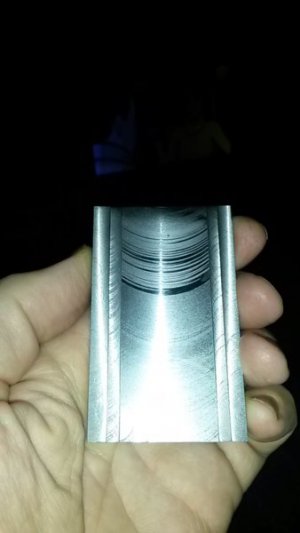- Joined
- Nov 25, 2016
- Messages
- 175
This concept may or may not have any adherents but it's worth a swing. I've been building my shop up slowly in the midst of some pretty extreme distraction in the real world. When I need to push something thru the mill, I open the enormous red box of end/ball/etc mills and grab something that seems like it will work, an for the most part I have not been disappointed, though that said, I'm not pleased with the caliber of my work in the precision/finish area. Time to start to cure or at least improve upon the influence of the tooling on this and build up a minimum working set of tooling.... comprised of the things most people would want in a shop into which they might be placed, before any project-specific tools are identified. i.e. what would a majority of proficient machinists define as a core set of tooling.
I'll locate the best samples from the ERB and hand those to the local sharpening service and there I will have a starting point. If I need to buy some, then I'll buy some. I know those won't remain sharp and one of my first projects will be a simple end-sharpening capability. The tool rests on my Delta grinder are garbage but that is easily cured.
From a simple end-mill positioning capability, I'll move on to something more sophisticated/versatile... make or buy. Make would be nice but you can't squeeze in everything when you're ancient (hope I finish this post ...
...
Right now, I just want to quickly form up a core of mill tooling. From things I have done like boating and off-road motorcycling, I know there exists the concept of minimal sets of critical items. I'm curious if perhaps someone who has set up some mill stations over time has arrived at "the list" for each new station they put into service. Thanks in advance for any potential assistance and take care.
I'll locate the best samples from the ERB and hand those to the local sharpening service and there I will have a starting point. If I need to buy some, then I'll buy some. I know those won't remain sharp and one of my first projects will be a simple end-sharpening capability. The tool rests on my Delta grinder are garbage but that is easily cured.
From a simple end-mill positioning capability, I'll move on to something more sophisticated/versatile... make or buy. Make would be nice but you can't squeeze in everything when you're ancient (hope I finish this post
Right now, I just want to quickly form up a core of mill tooling. From things I have done like boating and off-road motorcycling, I know there exists the concept of minimal sets of critical items. I'm curious if perhaps someone who has set up some mill stations over time has arrived at "the list" for each new station they put into service. Thanks in advance for any potential assistance and take care.


